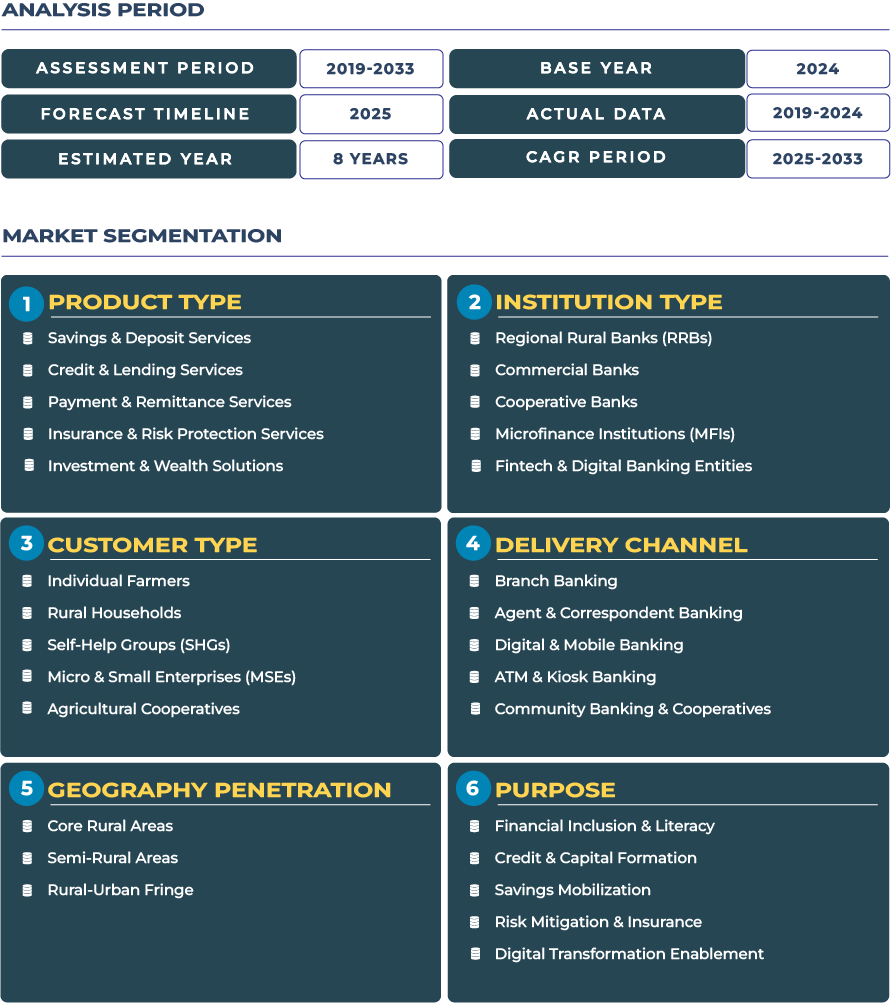UAE Rural Banking Market Outlook: Financing Arid-Region Agri-Tech and Cross-Border Rural Innovation
The United Arab Emirates (UAE) has emerged as a global leader in financing and developing arid-region agri-technology, transforming its rural banking market into a hub for innovation, investment, and sustainability. Unlike traditional rural banking ecosystems reliant on farmland lending, the UAE’s model leverages vertical farming finance, cold-chain logistics funding, and venture-backed agri-tech incubation as key instruments of economic diversification. This forward-looking strategy aligns with national priorities under the Central Bank of the UAE and the Ministry of Finance, both of which have been instrumental in enabling structured financing for sustainable agriculture projects.
Note:* The market size refers to the total fees/revenue generated by banks through various services.
According to DataCube Research, the UAE rural banking market was valued at USD 5.3 billion in 2025 and is projected to reach USD 7.0 billion by 2033, registering a steady CAGR of 3.7% during 2025–2033. The market’s growth reflects the nation’s successful pivot toward international rural finance and technology-driven agriculture models designed to overcome climatic limitations. With a focus on fintech-enabled credit, insurance for controlled-environment (CE) farming, and long-term sustainability-linked investments, the UAE rural banking industry has evolved into a global benchmark for resilient agricultural financing in arid environments.
UAE Rural Banking Market Outlook: How the UAE Became the Global Agri-Technology Hub for Arid Innovation
The UAE’s transformation from a desert economy to a center of agricultural innovation has redefined the purpose of rural banking. Rural finance in the Emirates now extends beyond local farms to encompass regional agricultural corridors and international food value chains. This evolution is powered by the country’s investments in vertical farming, hydroponic agriculture, and smart irrigation systems, which require specialized credit, insurance, and payment infrastructure.
The market’s momentum is also supported by the UAE’s extensive bilateral collaborations with Africa and South Asia, focusing on food security, technology transfer, and agricultural research. Emirati banks are deploying investment and wealth solutions aimed at creating regional self-sufficiency in food systems. The increasing adoption of sustainable finance instruments, such as green bonds and Islamic agriculture sukuk, further enhances investor participation and international capital inflows. As geopolitical and climate challenges continue to disrupt global food chains, the UAE’s innovation-led rural banking ecosystem has positioned itself as both a financier and a catalyst of global agri-technology resilience.
Drivers and Restraints: Innovation-Driven Rural Finance Meets Regulatory Constraints
Driving Forces: Building the Financial Infrastructure for Desert Agriculture
The primary driver of growth in the UAE rural banking sector is the government’s focus on fostering agri-technology in arid conditions. By positioning the country as a regional hub for controlled-environment agriculture financing, Emirati banks have attracted private equity, venture capital, and sovereign wealth participation. The establishment of initiatives like the Ministry of Finance’s Green Investment Framework supports blended financing for sustainable rural development and vertical farm expansion.
Another strong growth enabler is the UAE’s geographical advantage as a logistics and trade nexus connecting Africa, Asia, and Europe. This connectivity enhances access to rural export markets, thereby boosting the need for payment and remittance services that support agri-supply chain operations. The emergence of fintech platforms and Islamic banking instruments has also made agricultural micro-lending and farm insurance more accessible to regional SMEs, further expanding the ecosystem’s reach.
Restraints: Limited Domestic Agriculture and Policy Prioritization of Cross-Border Finance
Despite its global leadership in innovation, the UAE rural banking sector faces inherent limitations stemming from its minimal domestic agricultural base. Local rural lending remains negligible due to low arable land availability and reliance on imported food products. Moreover, regulatory focus is primarily oriented toward cross-border agricultural investment and strategic food security partnerships, rather than building traditional domestic rural credit systems.
Additionally, fluctuations in global commodity prices and logistical dependencies on external markets can impact the return on agri-investment portfolios. While the sector remains resilient due to sovereign backing, maintaining a balance between domestic financial inclusion and international capital deployment continues to be a challenge.
Trends and Opportunities: Arid-Region Finance Innovation and the Future of Controlled-Environment Agriculture
Major Trends: Sovereign-Backed Agri-Tech Project Finance and Venture Integration
One of the most defining trends in the UAE rural banking landscape is the rise of sovereign-backed project finance for desert agriculture. Emirati financial institutions are structuring project finance vehicles that blend public and private capital to fund vertical farms and smart greenhouse clusters. Venture-backed agri-tech startups, supported by domestic banks, are introducing automated irrigation and crop analytics systems, financed through sustainability-linked credit facilities.
Furthermore, insurance and risk protection services are being integrated into digital banking ecosystems to safeguard projects from climate volatility. These insurance-linked financial models are gaining traction in regions like Abu Dhabi and Dubai, which host most of the UAE’s CE agricultural infrastructure.
Key Opportunities: Blended Finance for Vertical Farms and Cross-Border Cold-Chain Hubs
Significant opportunities lie in expanding project financing for vertical farms and developing cold-chain infrastructure to connect regional agricultural hubs. The UAE’s continued investment in climate-smart agriculture and agri-finance partnerships ensures that its rural banking sector remains both globally competitive and regionally inclusive.
Competitive Landscape: Financial Innovation and Regional Partnerships Reshaping Rural Banking
The UAE rural banking industry is witnessing dynamic competition led by key domestic institutions such as Emirates NBD, Dhabi Commercial Bank, and Mashreq Bank. These banks are structuring innovative credit facilities, ESG-linked funds, and mezzanine financing tailored for agri-tech and cold-chain projects.
In May 2025, Emirates NBD announced its blended-finance project supporting vertical-farm expansion across arid regions. Meanwhile, sovereign wealth entities such as ADQ and the Mubadala Investment Company continue to anchor large-scale agri-tech investments that connect the Gulf with emerging rural markets in Africa and Asia.
The integration of venture finance, risk-sharing mechanisms, and sustainability-linked funding models reflects the UAE’s ambition to build a globally recognized rural banking ecosystem. These developments collectively mark the UAE as the financial nucleus for innovation-led desert agriculture.







